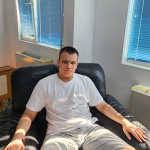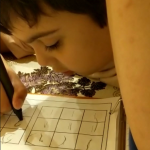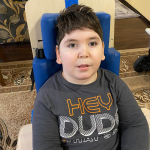Processual Autism
What is processual autism?
This is a form of autism-type disorder that occurs due to genetic factors. Another factor contributing to its development is psychological trauma suffered by a child before the age of 3. Severe mental stress negatively affects the formation of the brain, and therefore may cause pathological changes to occur.
If the cause is genetic, even with normal development, characteristic symptoms of the disease begin to appear after 1 year. These include general developmental delay, regression of acquired skills, and neuropsychological dysfunction.
Symptoms of processual autism
Doctors are able to make a correct diagnosis between the ages of 3 and 6 years as part of regular monitoring of childhood development and behaviour.
Main manifestations of the disorder:
- Unreasonably expressive speech
- Echolalia (repetition of words spoken by others)
- Speech impairment: babbling, simple monosyllabic phrases
- Use of second- and third-person pronouns when telling a story from their own perspective
- Partial or complete loss of acquired self-care skills
- Sloppiness in everyday life, such as eat with their hands (because the find it difficult to use tableware), and indifference to their appearance.
The clinical picture of processual autism includes the symptoms listed above combined with other signs of ASD, as well as intellectual disability. General symptoms are often complemented by affective, catatonic, and neurotic disorders. It should be noted that only a doctor can make a final diagnosis because each patient has their own set of symptoms and manifestations.
Varieties of processual type ASD
There are two types of this ASD: regressive endogenous and polymorphic. In the first case, catatonic dysfunctions with varying degrees of intensity are observed with elements of regression. This means that the patient gradually loses acquired skills, developmental delays begin, and speech deteriorates significantly. In the second case (polymorphic), mental disorders are also observed, such as appetite and sleep disorders, the development of phobias, and movement disorders.
Traditional treatment for processual autism
Medical care in the form of correctional and rehabilitation treatment is prescribed with this diagnosis. Antipsychotic, neuropeptide and nootropic drugs are used, as well as sessions with a psychologist and physiotherapy. Usually, such treatment helps to slightly delay the disorder’s progression, but does not help significantly long-term.
Advanced treatment for childhood autism spectrum disorder: the most effective method
The method of stem cell transplantation has been used for several decades to correct childhood autism of all types and stages. Even advanced progression can be corrected, while traditional methods do not give the desired effect. The use of stem cell therapy gives patients with processual type of ASD hope for a better future. The renewed brain will work more effectively, and after stem cell treatment, the symptoms of the disease will decrease in children, and it will then be possible to instill vital skills and master new information.
You can undergo modern treatment for processual autism in Georgia at the Mardaleishvili Medical Centre.
Sign up now — don’t waste precious time: timely treatment guarantees the best result!
Autism Treatment Center Videos
Autism treatment with own stem cells
Cord blood association congress
International Quality Crown
Autism Treatment Reviews
Autism treatment with own stem cells
The story of Alessandro (6 years old)
Autism Patient Testimonial - Stem Cell Treatment
Clients Testimonials

Feedback from Igor, David’s father (12 years old) Read More

Feedback from Olga, Fedya’s mother Read More

Feedback from Natalia, Radomir’s mother (15 years old) Read More

Feedback from Esther, Samuel’s mother (8 years old) Read More

Feedback from Abibe, Selim’s mother (7 years old) Read More












